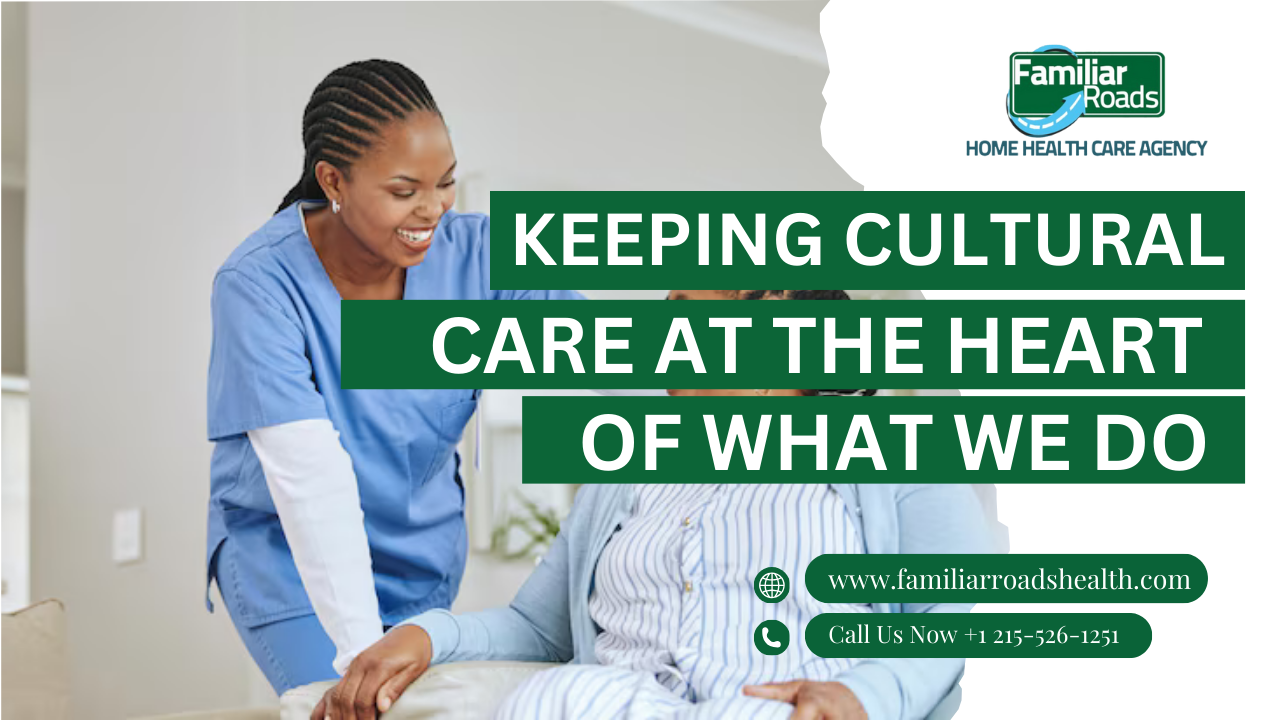In today’s diverse world, keeping cultural care at the heart of home healthcare means going beyond meeting medical needs—it involves recognizing and respecting each client’s cultural background, traditions, and values to provide truly personalized and compassionate care.
At the heart of compassionate caregiving lies cultural care—an approach that honors the unique identity of every individual and ensures they feel truly seen, heard, and respected.
Cultural care is not just a nice addition—it’s a necessity. When caregivers are culturally aware and sensitive, they foster stronger relationships, improve outcomes, and create environments of trust and dignity. This blog explores what cultural care means in home healthcare and how it shapes everything we do.

Cultural care is the practice of delivering care that is responsive to the cultural values, beliefs, and customs of each client. It includes understanding not only race or ethnicity, but also religion, language, family dynamics, gender roles, and traditions.
Respect for individual cultural backgrounds
Communication that reflects linguistic needs
Flexibility around traditional practices and schedules
Sensitivity to personal, dietary, and spiritual preferences
By acknowledging the full context of a client’s life, caregivers offer holistic support that honors their humanity.
Culture shapes how people view health, illness, treatment, and care. Without cultural understanding, even the most well-intentioned care can feel impersonal or intrusive.
Builds trust between caregivers and clients
Reduces misunderstandings and discomfort
Enhances compliance with treatment plans
Promotes emotional comfort and well-being
When clients feel their culture is respected, they are more likely to engage fully in their care and experience better health outcomes.
Personalized care begins with understanding what matters most to the client. This might mean adjusting daily routines, recognizing specific holidays, or respecting family hierarchies.
Providing meals that align with religious or cultural dietary practices
Accommodating prayer times or rituals during care hours
Understanding gender preferences for personal care
Being mindful of cultural norms around modesty, touch, and privacy
These small but powerful changes show that care is truly centered on the person, not just the patient.
Clear, respectful communication is vital to cultural care. Language barriers can lead to confusion or mistrust, so it’s essential to meet clients where they are.
Use interpreters when needed
Learn key phrases in the client’s preferred language
Be aware of non-verbal cues and cultural norms
Avoid assumptions or stereotypes
Listening actively and communicating with cultural awareness leads to more effective and compassionate care.

Caregivers must be trained not only in clinical skills but also in cultural competence. This means developing the awareness, knowledge, and behaviors needed to support diverse clients.
Self-awareness of one’s own cultural biases
Ongoing education on different cultures and practices
Respectful curiosity about clients’ experiences
Open communication and feedback
Caregivers who embrace cultural competence are better prepared to provide meaningful, personalized care to all individuals.
Culture is often most visible during holidays and life events. Home care should allow space for clients to celebrate their heritage.
Help prepare traditional foods
Assist in setting up decorations or religious items
Facilitate virtual family gatherings or cultural activities
Respect periods of fasting or observance
These moments of celebration affirm identity and bring joy, connection, and belonging.
Families are vital in cultural care. They provide insights into the client’s background and offer guidance on traditions and expectations.
Involve families in care planning and decision-making
Encourage open conversations about cultural needs
Connect with community leaders, places of worship, or cultural organizations
Together, caregivers, families, and communities form a circle of culturally sensitive support.
Keeping Cultural Care at the Heart of Home Healthcare means recognizing that every person brings a unique story, identity, and set of values to the care experience. By honoring those differences and weaving them into the fabric of care, we create services that heal the body, uplift the spirit, and respect the whole person.
In home healthcare, cultural care is not optional—it is essential. It builds bridges of trust, fosters dignity, and transforms care into a deeply human connection. As caregivers, let us continue to learn, adapt, and grow in our understanding of the diverse communities we serve—because true care begins with cultural respect.
Need help navigating your Keeping Cultural Care at the Heart of What We Do? Contact Familiar Roads Home Healthcare today!
Call: 215-526-1251
Email: info@familiarroadshealth.com
Website: www.familiarroadshealth.com
Copyright © 2025 Familiar Roads Home Health Care Agency, All rights reserved
Made By Digi Grows LLC